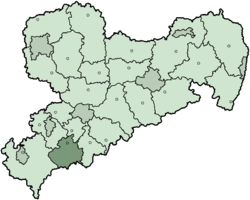Free Republic of Schwarzenberg
| Free Republic of Schwarzenberg | |||||
| Freie Republik Schwarzenberg | |||||
| |||||
|
| |||||
 Darkest green: the modern district of Aue-Schwarzenberg within Saxony. The district of Stollberg lies to the north. | |||||
| Capital | Uncertain | ||||
| Government | Not specified | ||||
| Historical era | World War II | ||||
| - | German capitulation | May 8, 1945 | |||
| - | Soviet occupation | 24 June 1945 | |||
The Free Republic of Schwarzenberg (German: Freie Republik Schwarzenberg) is a term now used for an unoccupied area in Western Saxony that existed for several weeks after the German capitulation on May 8, 1945. After the surrender of Germany, the districts of Schwarzenberg, Stollberg and Aue, in the Ore Mountains, were left unoccupied, for reasons that are unclear. Over time, anti-fascist action groups formed local governments in the 21 towns and villages. This status quo ended when Soviet troops finally occupied the area on June 24, 1945.
There is some speculation as to why neither American nor Soviet troops occupied the area. One explanation may be that the Soviets and Americans agreed to halt on the banks of the river Mulde. As there are several rivers with this name, and the Schwarzenberg area lies between them, a misunderstanding could be the main reason. Another possible explanation is that the Allies simply overlooked the area.
The name "Free Republic of Schwarzenberg" actually derives from the 1984 novel Schwarzenberg by Stefan Heym. As the novel is based on actual events, the name has become a convenient descriptor.
References
- Stefan Heym, Schwarzenberg (Munich: Bertelsmann, 1984), ISBN 3-570-00140-7
